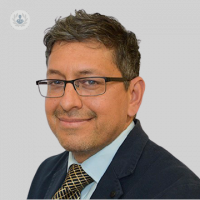The advantages of laparoscopic hernia surgery
Written in association with:Laparoscopic hernia surgery is the preferred surgical treatment option for hernia, a common and very painful condition. In his latest article, renowned consultant surgeon Mr Atul Bagul explains the advantages of this procedure.

What is laparoscopic hernia surgery?
Laparoscopic hernia surgery is keyhole surgery where we make small incisions on your tummy and use a camera, with a view to repairing the hernia. A hernia is a defect in the muscle wall which can be from a natural process, or it could be following an operation, which we call an incisional hernia.
The plan here would be to reduce the contents back into the tummy, close the defect with sutures, and then patch it with mesh. When we do this procedure with laparoscopic surgery, we put a mesh inside of your tummy and fix it with clips.
Is laparoscopic surgery better for hernia surgery?
Most laparoscopic surgery is better for repairing hernias. There are multiple benefits to keyhole surgery:
- Quicker healing time
- Fewer problems with wound complications
- Less pain
- You can go home sooner

Is it a painful procedure?
Most surgical procedures are associated with pain. There are multiple techniques and medications we can use to reduce pain and bring it under control.
Keyhole surgery tends to be less painful than open surgery. Your wounds are smaller and there is much less pain. The aim is to get you up and moving and get you home sooner, and reduce associated complications with it.
How long does it take to recover after the surgery?
This depends on the type of hernia surgery you are listed for. If it's a hernia surgery for your groin (inguinal hernia) then you will get to go home the same day, or the day following the surgery. You will be able to resume your normal activities, such as driving, within two weeks.
We ask you not to lift heavy weights for about three months. This is to reduce the risk of the hernias coming back. If it's an incisional hernia or a much bigger hernia, then of course the recovery time is a bit slower compared to that but most people are back to their routine activity in about four to six weeks
What are the disadvantages of laparoscopic hernia surgery?
There are side effects or risks associated with any surgical procedure. As with laparoscopic surgery, there is a small risk of damaging structures on the inside of the body. The risk is small, under one per cent.
The other risks would be chronic pain, scar tissue, and the hernia coming back. Overall, keyhole surgery gets you home and feeling as soon as possible. For this reason, keyhole surgery is preferred.
Mr Atul Bagul is a leading consultant surgeon based in Leicester, with more than 25 years of experience. If you are worried about a hernia or any other condition that may require a laparoscopic surgical procedure, you can book a consultation with Mr Bagul via his Top Doctors profile.


